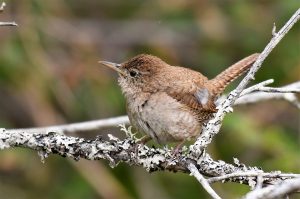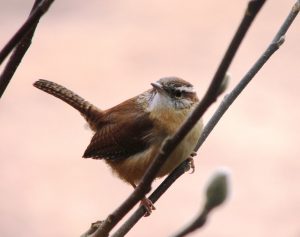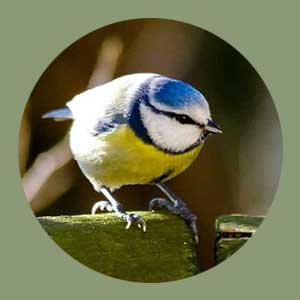Wrens are common birds that are found in many places throughout the UK. They are competent nest builders, even if that is on the edge of a cliff, high in a mountain, in the eves of a barn, or on farmland. Parks and woodland are often rife with the small birds.
They are chubby little guys, small rounded bodies with warm brown and cream feathers. They have short narrow tails that they often have cocked.
You will probably already have wrens visit your garden, if you don’t see them, you will undoubtedly hear them. Their beautiful loud warbling belies their tiny stature.

Spotting them is more difficult. They are permanently on the hunt for food, darting frenetically in the bark of trees, bushes, and leaf piles, looking for insects.
Knowing how to attract wrens to your garden is a frequently asked question, one which we will try to answer for you.
A combination of factors will pique the wren’s interest; a steady food supply, things to build a nest with, and somewhere to build it.
Just like most UK garden birds, the wren just wants somewhere to fill his belly and a safe place to live.
Offering his favourite titbits, dried mealworms, and having trees and shrubs in the garden is a sure-fire way to attract his attention.
Table of Contents
What foods should I leave out for wrens?
Wrens are mostly meat-eaters and enjoy all kinds of insects. They love beetles, moths, flies, and spiders, they are even partial to the occasional snail. So offering them something that mimics their favourite food makes sense. A feeder full of dried mealworms will sendthem into a frenzy. We prefer to soak ours first, they plump up and become juicier and easier to digest.
They will eat from hanging or ground feeders, and if neither of those is available, sprinkle a mound of mealworms near to the base of trees or shrubs.
They are shy creatures who don’t enjoy being out in open spaces. They are always on the lookout for predators.
Wrens will eat some plants and fruit, so apple or pear slices might interest them if there is nothing else around. They enjoy peanuts but whole ones are far too dangerous for their tiny beaks and gullets. Consider home-made peanut butter in a food processor, don’t add any salt, instead try adding a spoonful of honey. This is a tasty and healthy sweet treat, (not just for the wrens)!
Wren’s like a drink
Don’t we all, I hear you echo! But really, wren’s are often looking for somewhere to quench an unending thirst. Keep your water dishes and birdbaths topped up and they will make several return visits.
Where do Wrens Nest?
House wrens are given that name for an obvious reason. They may be shy and a little socially awkward, but they are confident about living near to humans.
They build their nests under cover of branches, leaves, and shrubbery to keep them hidden away. So a garden with trees and bushes is a favourite resting spot. This is where they will catch most of their food, foraging through branches and shrubbery.
In the wild, the male wren will make several nests nearby. He will then offer the female the choice of her abode in a bid to attract and keep her. They will return year upon year.
Hanging several small birdhouses close to each other mimics this idea and appeals to a wren on the lookout for somewhere to shelter.

A Wren’s Building Materials
Wrens quite like wild gardens. Long ferns and grasses make ideal nest supplies. Tiny twigs, their feathers, and bits of plant mould together well. They will even use animal fur, so if you have a pet that regularly moults in the garden, the wren will spot it and make use of the discarded fur.
And finally…
The wren has a fondness for lush gardens, full of natural habitats for the mini-beasts that he so loves to eat.
An endless supply of mealworms and water is how to attract wrens to your garden, and encourage them to make many return journeys.
Would it be impolite to call him small, round, and dumpy? I don’t think so, it’s a term of affection and the easiest way to spot the tiny bird with the beautiful loud singing voice.

Thank you for your advice on the Wren’s. Ive recently just got one nesting in a small willow bird box, and its just on the side of the shed facing west, so gets the evening sunlight and is sheltered under the eaves of the shed, I wa interested in what to feed them and will now soak my meal worms as advised and I will sort some peanut butter, hoping they stay or return once nested.
Thanks
Elaine
Thank you for your advice. I have seen a wren foraging in my garden for a couple of days now and did not know what to feed it. Luckily my local pet shop has mealworms and I have salt fee peanut butter and honey. I have signed up for your monthly newsletter
I love the wrens that come each year to our western Canadaian garden! I love to listen to them. They use our nesting boxes we purchased from a local senior care hospital. I am wondering, is it correct to empty these boxes every spring from last years nesting materials? Thank you.
Hello,
Hopefully our article here: https://www.gardenbirdfeeder.co.uk/should-you-remove-old-bird-boxes/ should help you with this one!
Yes you should remove the materials but only at the right time
Take care
Hi Walter
Thanks for providing great information in a useful format. I’ve seen a wren foraging around the low box hedge that borders my raised patio. They are quite elusive but I think they are so cute & so very small. Do they stay in the UK through the winter? I can’t imagine how they survive.
Cheers
Kay
Hi Kay,
https://www.gardenbirdfeeder.co.uk/do-wrens-migrate/
This article here should help answer your question!
Thanks
Walter
I have a wren who has built her nest in an ornament of a bee that is attached to the trellis.she is always flitting about and seems quite at home with us in the garden.
I loved wrens we had them nesting in an old pallet that i planted up. Sadly I have just found 3 of them dead? What could have done this? I have lots of bird food and several water sources. I don’t use chemicals in my garden. Wondering if you know what could have happened? Thanks
How sad, sometimes birds will abandon their nests if they are spooked by activity or other birds. It quite often happens and has happened to us in our garden too